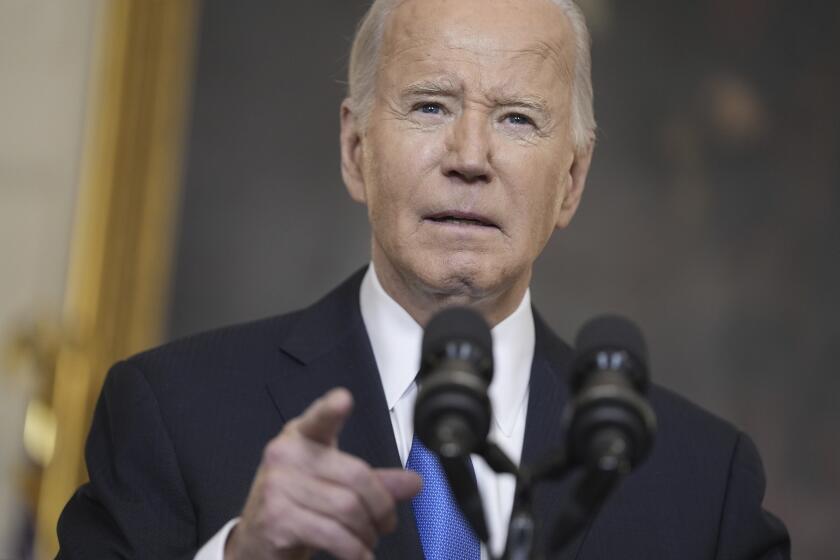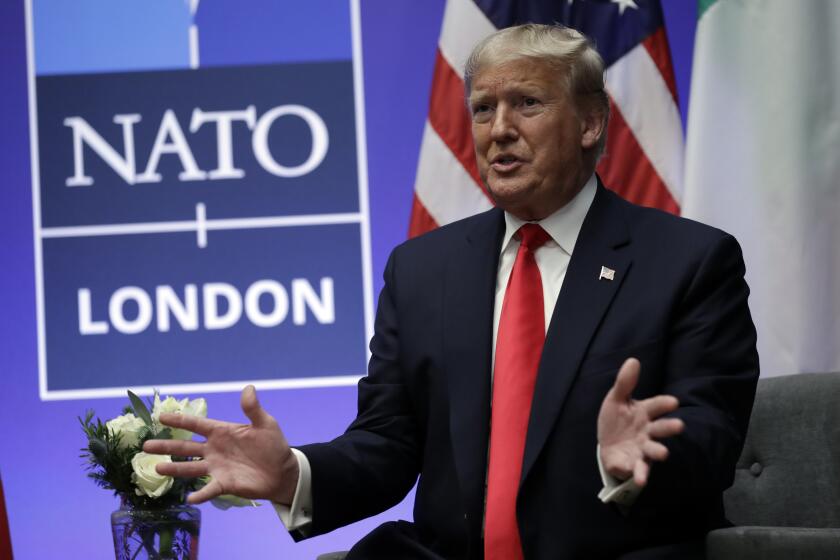Johnson says House won’t be ‘rushed’ to approve aid for Ukraine, Israel, other allies

- Share via
WASHINGTON — Republican Speaker Mike Johnson said Wednesday the U.S. House will not feel “rushed” to pass a $95.3-billion foreign aid package for Ukraine, Israel and other allies, signaling a further stall over sending military hardware and munitions Kyiv badly needs to fight Russia.
Johnson (R-La.) made the remarks behind closed doors at a morning meeting of House Republicans, who are in the majority in that chamber and largely aligned with Donald Trump, the party’s presidential front-runner. Trump opposes the Senate-passed foreign assistance for Ukraine’s fight against Russian President Vladimir Putin’s invasion.
The speaker let colleagues know that the House will instead “work its will,” in considering the package, said a person familiar with the private remarks and granted anonymity to discuss them.
“The Republican-led House will not be jammed or forced into passing a foreign aid bill,” Johnson said at a news conference afterward.
Johnson, who rejected a border security compromise that was eventually stripped from the final product, said the Senate’s package “does nothing” to secure the U.S.-Mexico border, which has been the GOP’s priority.
The remarks from the speaker, who has personally said he wants to support Ukraine but leads a far-right majority, throws the foreign aid package into serious doubt, despite its approval this week by an overwhelmingly bipartisan vote of Democratic and Republican senators.
The slow-walk of U.S. aid to an ally during the largest ground war in Europe since World War II shows how much many Republicans have retreated from overseas leadership in line with Trump.
President Biden has warned that refusal to take up the bill would be “playing into Putin’s hands.”
President Biden calls for House Republicans to support a spending bill that would send $60 billion to Ukraine for its fight against Russia’s invasion.
In his own remarks from the White House, Biden said Tuesday that approving the bill “is standing up to Putin,” raising his voice in strong comments as he referred to the Russian leader. “We can’t walk away now. That’s what Putin is betting on.”
Separately, Defense Secretary Lloyd J. Austin III made his own push for Ukraine aid in a virtual session with the Ukraine Defense Contact Group, some 50 countries that coordinate military support for Ukraine.
Austin conducted the online meeting from his home, where he is recuperating from complications after prostate cancer surgery.
Trump’s comment about NATO and Russia was the latest instance in which the former president seemed to side with an authoritarian state over U.S. allies.
In Congress, meanwhile, one last-ditch effort coming from a number of lawmakers — Democrats and some Republicans — would be to employ an unusual procedure that would force the House to take up the bill for a vote over the objections of the Republican speaker and his leadership.
The so-called discharge petition is a cumbersome, long-shot approach, but it’s one way to leverage the political power of the more centrist Republican lawmakers in a coalition with Democrats to ensure aid to Ukraine and the allies.
Democratic Leader Hakeem Jeffries would not comment Wednesday on using the discharge petition process to move the foreign aid package, but said he wants the speaker to put the package forward for an “up or down vote.”
“Republicans are either going to stand with America’s national security or continue to stand with Vladimir Putin,” Jeffries told reporters after his own morning meeting with his Democratic caucus.
Central to the $95-billion package has been the aid for Ukraine, a $60-billion allotment that would go largely to U.S. defense entities to manufacture missiles, munitions and other military hardware that is being sent to the battlefields in Ukraine.
It also includes some funds to help the government in Kyiv stay afloat during the war, but not as much as first proposed, as Republicans balk at shoring up services abroad when there are needs in the U.S.
The money for Ukraine, as well as for Israel and Taiwan, is largely military-related and spread in states across the U.S. that are home to domestic manufacturing for what supporters have called the “Arsenal of Democracy” — harking back to last century’s language for the U.S. role abroad.
Associated Press writer Kevin Freking contributed to this report.
More to Read
Sign up for Essential California
The most important California stories and recommendations in your inbox every morning.
You may occasionally receive promotional content from the Los Angeles Times.












